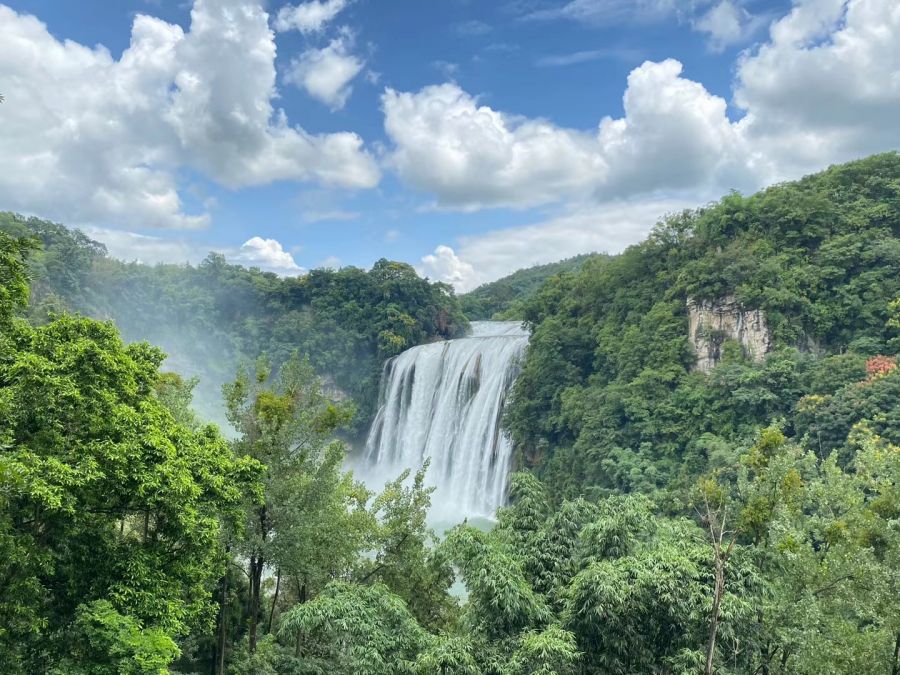Chinese Name: 黄果树瀑布 Pronunciation: Huáng Guǒ Shù Pù Bù
Height: 77.8 meters
Width: 101 meters
Tourist Area: 115 square kilometers
Suggested Visiting Hours: 3-4 Hours
Address: Zhenning Buyi and Miao Autonomous County, Anshun City, Guizhou Province
| Tickets | Peak Season (March 1st – November 30th) |
Low Season (December 1st –February 28th ) |
| Admission Fee (Including Giant Waterfall Resort, Tianxing Bridge, Doupotang Waterfall) |
160 yuan | 150 yuan |
| Huangguoshu Stone Museum | 70 yuan | |
| Stone Village | 40 yuan | |
| Huangguoshu Ecological Science Experience Museum | 80 yuan | |
1.Children under 14 years old (with valid certificate) or below 1.4m in height are free of charge;
2.Senior citizens over 60 years old (with valid ID card or passport) are free of charge;
3.Elderly people over 80 years old (excluding 80) who need to be accompanied can have 1 an escort who enters free of charge;
*The above policy is only applicable to the admission fee.
| Items | Price |
| Scenic Sightseeing Car | 50 yuan |
| Automatic elevator at the Giant Waterfall | 50 yuan(round-trip) 30 yuan(one-way) |
| Tianxing Bridge Ropeway | 10 yuan |
| Note: Transportation facilities above are voluntary consumption. | |
| Items | Opening Hours |
| The Giant Waterfall & Doupotang Scenic Area | 07:30-18:00 |
| Tianxing Bridge Scenic Area | 07:30-17:30 |
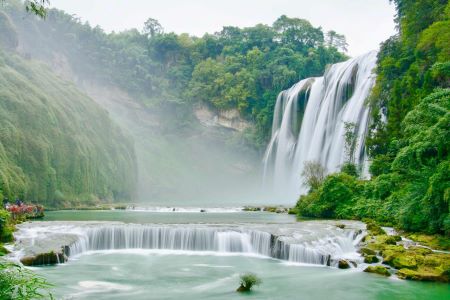
Located in Zhenning Buyi and Miao Autonomous County, Anshun City, Guizhou Province, China, 128 kilometers away from the provincial capital Guiyang, and 45 kilometers away from the tourist center of Anshun, Huangguoshu Waterfalls Scenic Area is a national key scenic area. There are Yunnan-Guizhou Railway, Zhuzhou-Liu Double-line Railway, Huangguoshu Airport, 320 National Highway, Guihuang High-grade Highway, and the newly built Qinghuang (Qingzhen to Huangguoshu) Expressway directly to the scenic spot.
Huangguoshu Waterfall, namely the Giant Waterfall, was called “Baishuihe Waterfall” in ancient times. It is also known as "HuanggeshuWaterfall" or "Huangjueshu Waterfall", because of the wide distribution of "Huanggerong" (a species of banyan trees). It belongs to the mid-subtropical zone and is a typical lava region with a mild climate and abundant rainfall. In the scenic area, the Huangguoshu Waterfall is the center. There are 18 waterfalls of different sizes, including majesty, peculiarity, danger, and gloriousness, forming a huge waterfall "family".
Huangguoshu Waterfall became famous from Xu Xiake, a traveler in the Ming Dynasty, and became a well-known scenic spot after traveling and spreading by celebrities in the past. Also, Huangguoshu Scenic Area was rated as the largest waterfall group in the world by the Guinness Headquarters of the Great World and listed in the Guinness World Records.

On April 23, 1638 (the eleventh year of Ming Chongzhen), Xu Xiake, a geographer, traveler, and essayist in the Ming Dynasty, entered Yunnan via Huangguoshu Waterfall, and made an investigation and record of Huangguoshu Waterfall. All previous dynasties writers and literati who came to Huangguoshu Waterfall wrote poems and articles to praise Huangguoshu Waterfall.
After the 1980s, a large number of Chinese and foreign celebrities visited Huangguoshu and wrote inscriptions. Some distinguished Party and state leaders visited Huangguoshu successively.
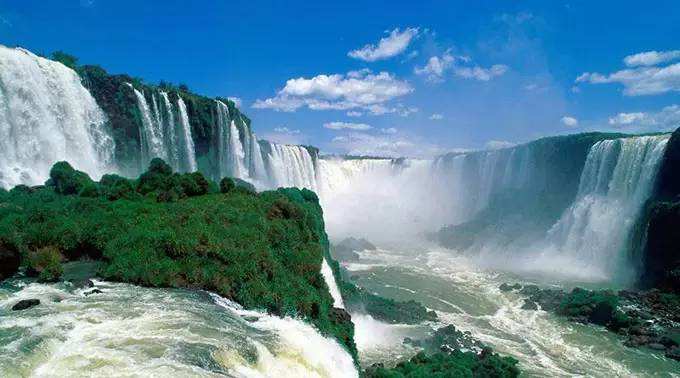
Huangguoshu Giant Waterfall is the main scenic spot, covering an area of about 8.5 square kilometers, including Huangguoshu Waterfall, Bonsai Garden, Water Curtain Cave, Rhinoceros Pool, Horseshoe Beach and other scenic spots.
Huangguoshu Waterfall is located in a low-lying area in western Guizhou. It has a low altitude and is frost-free all year round. The annual average temperature is about 14°C. There is no severe cold in winter and no scorching heat in summer. January is the coldest month, with an average temperature of 4.3°C, but the lowest temperature rarely drops below zero; July is the hottest month, with an average temperature of 22°C, and there are basically no hot days.
Huangguoshu Waterfall is the largest waterfall in China and one of the famous waterfalls in the world. The rushing water from a cliff more than 70 meters high poured out of the Rhinoceros Pool with a tremendous roar.
Huangguoshu Waterfall is divided into the large water, medium water and small water. With the change of flow, the landscape is also different. The unique peculiarity of Huangguoshu Waterfall is the Water Curtain Cave hidden in the middle of the waterfall. In the Water Curtain Cave, people can see the rainbow on the Rhinoceros Pool from the windows of each cave. As long as it is sunny, the rainbow can be seen from 9 a.m. to 5 p.m., and it changes and moves as people move around.
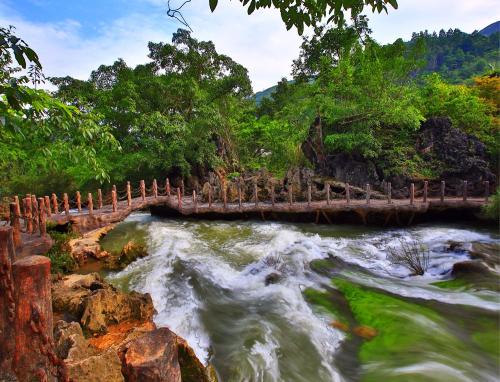
Guizhou Tianxing Bridge Scenic Area is located 7 kilometers downstream of Huangguoshu Waterfall. It is a beautiful combination of stone, trees and water, and a natural basin area formed by the changes of stone forests on the water.
Tianxing Bridge Scenic Area is a fully developed scenic spot in Huangguoshu Scenic Area. The planned area of the scenic area is 7 square kilometers, and the development area is 4.5 square kilometers. It is divided into three connected areas, namely Tianxing Basin Scenic Area, Tianxing Cave Scenic Area, and Water Stone Forest Area. Tianxing Cave is in the middle of the Tianxing Bridge Scenic Area. In addition to visiting the stalactites in the cave, the scenery outside the cave is also very special.
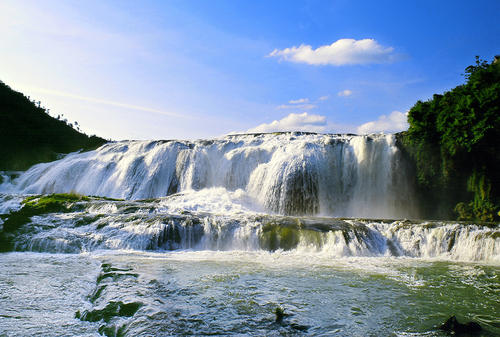
Doupotang Waterfall is located at 1 km upstream of Huangguoshu Waterfall. The top of the waterfall is 105 meters wide and 21 meters high. It is the widest waterfall in the Huangguoshu Waterfalls. On the top of Doupotang Waterfall is a huge karst pool with an area of 15,000 square meters, and the waterfall is formed on a calcified beach bar with a length of more than 100 meters. There is another special phenomenon of Doupotang Waterfall: Every time before the flood comes, the waterfall will make a roar of "boom, boom", so it is also called "Roar Waterfall".
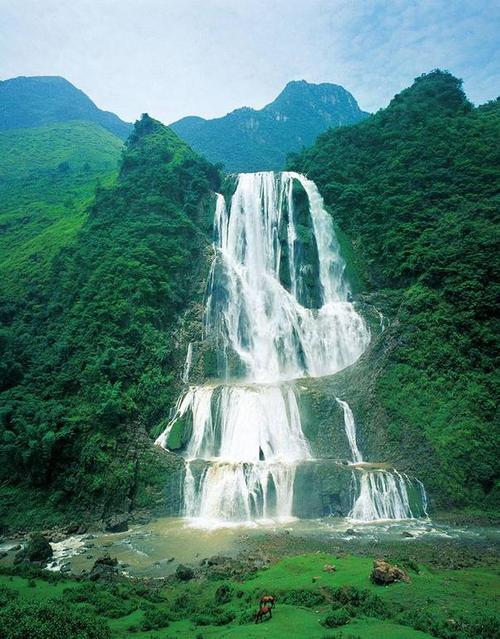
Dripping Shoal is located at 8 kilometers west of Huangguoshu Waterfall, and it is the top waterfall of Huangguoshu Waterfalls. The two mountains face each other here, with Dapoding on the east, Guansuoling on the west, and the 700-meter deep Baling River Gorge in the middle. The waterfall hangs on the large Guansuoling Mountain. The total height of Dripping Shoal is 410 meters, which is five times that of Huangguoshu Waterfall. The lowest level is 134 meters, and it is steep majestic and magnificent.
Dripping Shoal is composed of three waterfalls, the top one is called Liantian Waterfall, the middle one is Chongkeng Waterfall, and the bottom one is Gaotan Waterfall. The total height of the waterfall is 316 meters, of which Chongkeng Waterfall is 160 meters high and Gaotan Waterfall is 130 meters high. Because the waterfall is deep in the canyon, many places are hidden by cliffs.
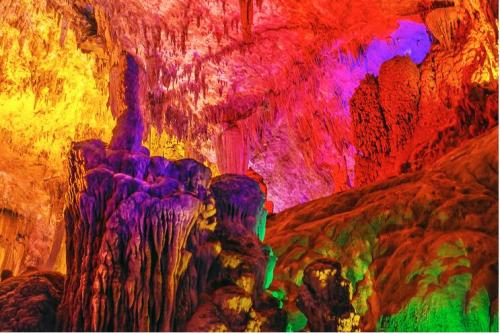
Huangguoshu Shenlong Cave is located at the core of Huangguoshu Scenic Area, 3 kilometers upstream of Huangguoshu Waterfall, with a bottom area of about 380,000 square meters that has been discovered so far. It has a total length of 4,640 meters, an average height of 21 meters, and an open lane of 1,600 meters. The journey takes about 70 minutes, and the underground river at the bottom is connected to the Huangguoshu Waterfall.
The caves are crisscrossed, and various cave landscapes emerge in endlessly. Shenlong Cave was once used as a military fortress for the local indigenous ethnic minorities to resist officials and bandits. The military facilities are still preserved and are respected as "magical cave" by the local indigenous ethnic minorities. Shenlong Cave is well protected and open to visitors.
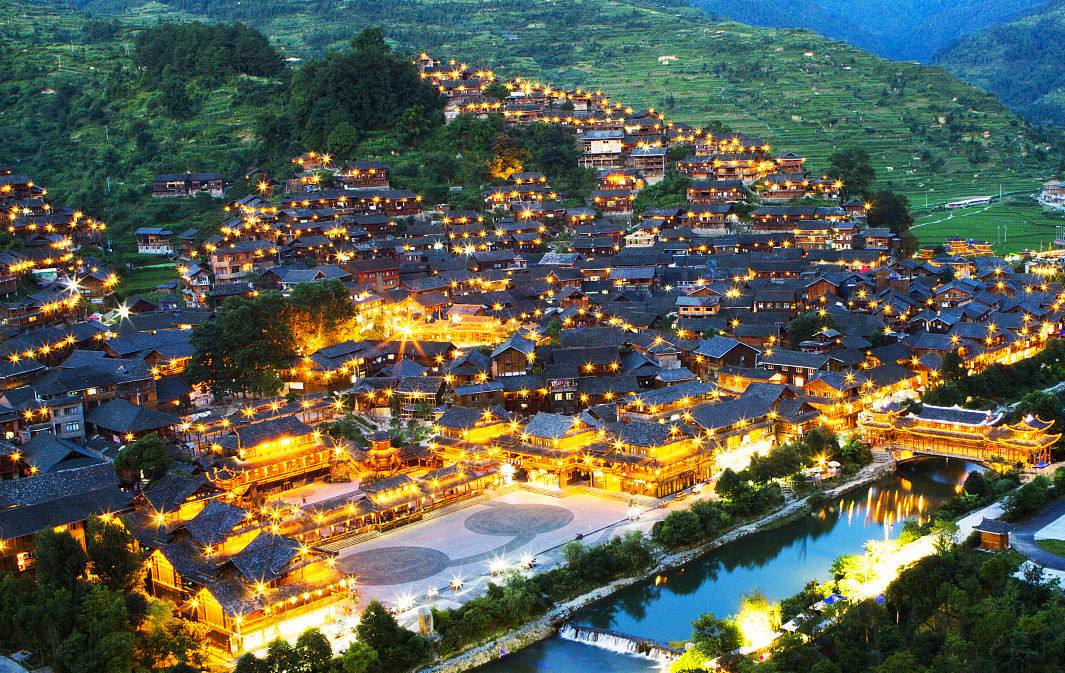
Stone Village is a Buyi ethnic village with this typical stone building, about 6 kilometers south of Huangguoshu Waterfall, and its residents are mostly under the surname of “Wu”. It is said that, 600 years ago, there was a Buyi man surnamed Wu who came here to develop the land, and the villagers now were all his descendants. There are 200 households with more than 1,000 people in the whole village.
Stone Village is surrounded by tall and straight mountains and beautiful waters. The front of the village is connected to the paddy fields, and the back of the village is shaded by green trees. There is a wide stone river on the side of the village. The water is crystal clear, and fish are common in groups chasing each other. The Banks of Stone Village are dotted with bamboo trees and fruit trees. Under the sunshine, they are like patches of white clouds scattered among the green hills and water, forming a unique beautiful scenery of the mountain village.
New City Ticketing Center → Stone Archway → Baidou Road → Wetland Park → Doupotang Waterfall → the Huangguoshu Waterfall → Commodity Street → New city Bus Pick-up Point
The route takes about five hours to walk all the way. This walking route does not reach the Tianxing Bridge Scenic Area. As there is no walkway to reach the Tianxing Bridge Scenic Area, tourists need to purchase a sightseeing ticket to get there.
The best time to visit Huangguoshu Waterfall is from June to October.
Please note that the topography of the scenic area is complex and there are more opportunities to climb and descend, so it is better to carry fewer items when visiting. Do not wear high-heeled leather shoes or plastic sandals when visiting.
The temperature in the scenic area is around 30 degrees in summer, and the solar radiation is strong. Please prepare appropriate sun-shading clothes and hats. Watch out for colds when the temperature is low after it rains.
In summer, Huangguoshu Waterfall is at its peak of water flow, so many of the paths are very slippery. Especially when passing through Water Curtain Cave, the water mist from the waterfall is very heavy, so waterproof items should be prepared. In addition, the food in Guizhou tends to be spicy, so you need to remind the waiter in advance whether to put chili or not when dining inside the scenic spot.
Huangguoshu Waterfall is located in Anshun City, Guizhou Province. People can go directly to Anshun or Guiyang from various places, and then take a bus directly to Huangguoshu Waterfall Scenic Spot.
1. Guiyang-Huangguoshu
There are buses from Guiyang Jinyang Bus Station to the Huangguoshu Ticket Center parking lot (Xincheng Station) every day, and there are also return trips. The fare is 55 yuan per way, the insurance is 3 yuan per person, and the journey takes about 2 hours. If you start from Guiyang to Huangguoshu Waterfall or return to Guiyang from Huangguoshu Waterfall, this bus is a suitable choice.
Address: No. 331, Jinyang South Road, Guanshanhu District, Guiyang
2. Guiyang Departure Time: 7:30-12:45
Huangguoshu Ticket Center Parking Lot Departure time: Starts at 10:00 (from March to October, the latest bus departure at 18:30; from November to February, the latest bus departure at 18:00)
3. Anshun-Huangguoshu
There is a direct bus from Anshun Passenger Transport (Temporary) East Station to Huangguoshu Waterfall. There are frequent departures. The fare is 20 yuan and this journey takes about 50 minutes.
Address: At the east expressway exit station at the intersection of Liangliu Road, Liangsuo Tun, Anshun
By Taxi
Chinese: 请带我去黄果树瀑布。English: Please take me to the Huangguoshu Waterfall.
If you take a taxi from Anshun Huangguoshu Airport to Huangguoshu Waterfall scenic spot, it will take about an hour and a half, which costs about 200 yuan.
